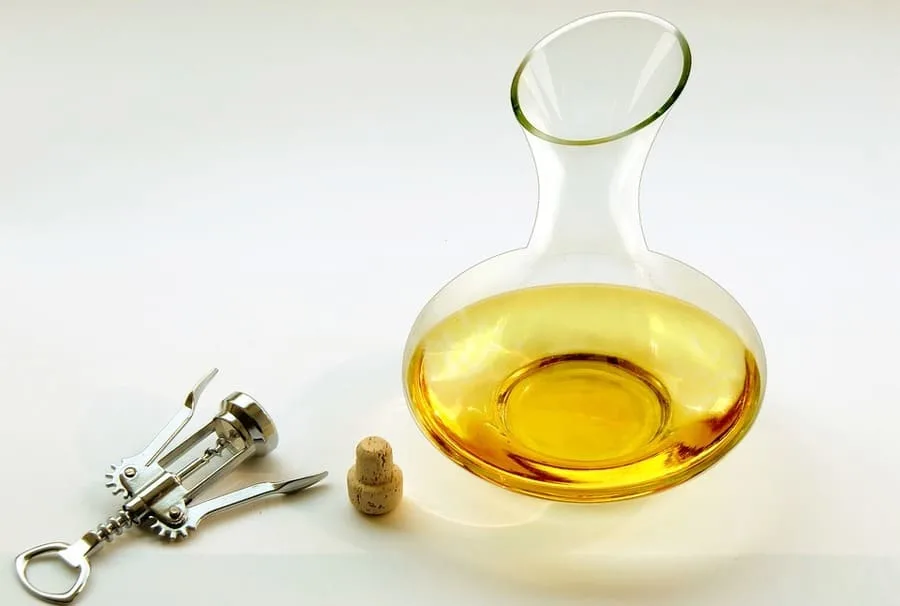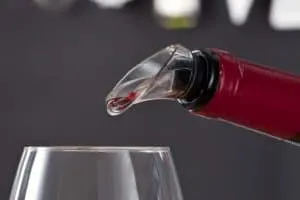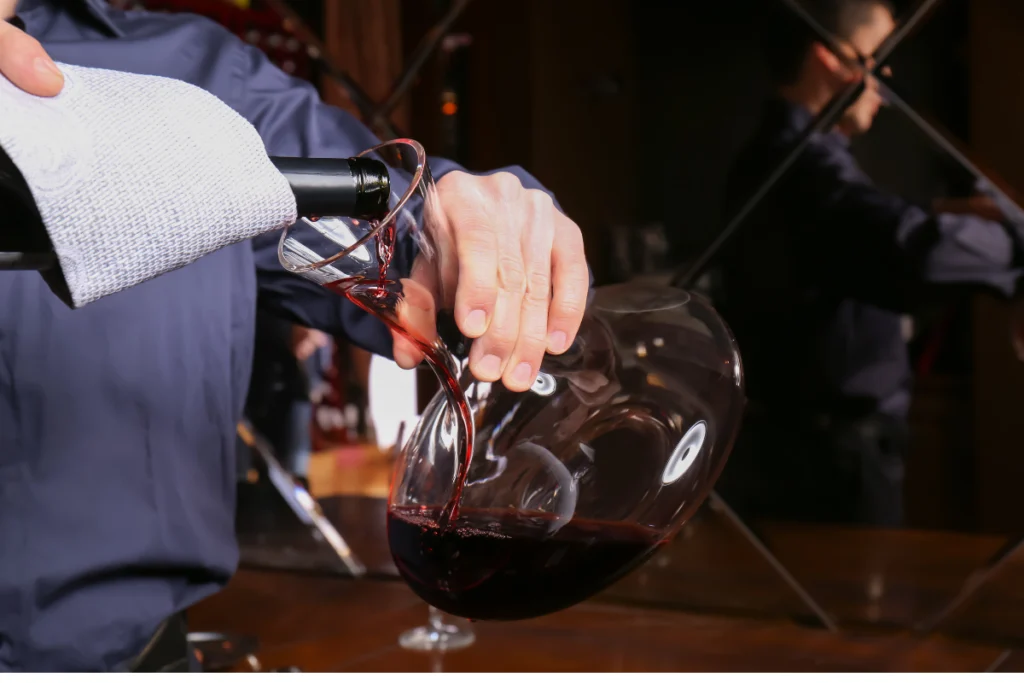As an Amazon Associate, I earn from qualifying purchases with no additional costs for you.
So you’ve been searching for a wine decanter and see that some come with stoppers and some don’t, and now you don’t know which one you should buy. Admittedly, selecting the right decanter for your wine and making the decision about a stopper can be a tough one.
Does a wine decanter need a stopper? No, a wine decanter doesn’t need a stopper. Decanters that come with stoppers are only useful if you often find yourself not finishing your decanted wine. You would not use a stopper when decanting wine as the purpose of decanting is to allow the wine to breathe.
In what situations would you want to stop up a decanter then? In general, you’ll only put enough wine in your decanter for you to drink. However, if you overestimate how much you’ll drink and have extra in your decanter, you don’t want to pour the decanted wine back into the bottle.

TIP: If you want to check out the best refrigerator for wine storage, I recommend trying out the Avation (18 bottles) compressor refrigerator with Wi-fi smart app control cooling system. You can find this refrigerator by clicking here (Amazon link).
Why Do I Not Need a Stopper for a Wine Decanter?
Decanting your wine will improve it regardless of if you spend over a million on a bottle or only a couple of dollars. Pouring it from the bottle into the decanter puts it in contact with the air before you allow it to sit and rest for some time. Allowing it to breathe will only enhance its notes and flavors.
It’s easy to pour too much wine into the decanter. Whether you’re by yourself or with friends, you may have some wine left in your decanter after you’re done drinking. For this reason, you may want to purchase a stopper for the decanter or a decanter that comes with its wine stopper.
Stoppers are typically only used with wine bottles, as plenty of people prefers to only drink part of the bottle and save the rest. You can purchase decanters that come with a stopper or purchase a stopper separately.
However, if you purchase one separately, make sure it’ll fit your decanter. I recommend just getting a decanter that comes with a stopper. It is way easier than trying to fit one not built for the mouth of the decanter.
TIP: If you are not sure which wines can be decanted and which shouldn’t, read this article. Find out how long wine will last once decanted here.
Even with a Wine Stopper, Be Cautious with the Decanter

A wine decanter isn’t supposed to be used to store wine. White wine should be allowed to breathe and aerate before we drink it, you don’t want to leave your wine out to aerate all the time.
This will make your wine taste worse. Advanced oxidation will ruin your wine very quickly once opened. A 2009 study by Karbowiak and colleagues displayed how critical the cork is for preventing oxidation and once removed, how oxidation can slowly ruin the opened wine.
Now, when you open a bottle of wine, it is almost impossible to get the air out of the bottle, unless you use a recording method. As the wine has been sealed inside the bottle for most of its existence, the flavor inside is just the wine, with no other contaminating flavors.
Once you open a bottle of wine, you’re breaking the seal and allowing air into the bottle, which carries with it other flavors and scents.
If you’ve ever left something in the fridge uncovered only to eat it and realize it tastes like your fridge, you know how tastes and smells can spread.
Allowing your wine to sit out, open, will cause your wine to pick up on other flavors beyond the oxidation process which also degrades wine.
An opened wine bottle is better protection from contaminating flavors than a decanter. A stopper on a decanter may help, but it’s difficult to get a tight fit on them unless you purchase them together.
TIP: For tips and facts on decanting wine into a bottle, read this article. Did you know that the best way to wash a decanter is in the dishwasher?
How to Decant Wine & Where Wine Stoppers Apply

Decanting wine isn’t done very often anymore. It used to be much more common, at least for those wealthy enough to have servants to decant the wine. It’s something of a tedious process, and most of us simply pour it into our glass and call it decanted.
However, if you’re willing to put in a little work to decant your wine, it can improve flavor greatly. Decanters are also beautiful statement pieces, whether you’re serving from them or not. Simply having one out as décor and being able to say you use it will give you an old-fashioned flare.
1. Choose Your Wine Decanter
There are many shapes of wine decanters, and each one will give you a slightly different effect. Also, if you choose to purchase a stopper, you’ll need to keep in mind what shape your decanter is for it to fit properly.
Why are there different shapes for wine decanters? A quick Google search will reveal thousands of decanters, with hundreds of variations on the standard decanter. You’ll want to look into what type of wine each is intended for, or what it boasts of doing best.
For instance, you can purchase one type of decanter for your Merlot and then another for your other wines. Not all decanters are named after the wine they’re intended for; some are just named for the shape they resemble.
There isn’t a universal “best” wine decanter. You’ll simply need to look into what decanter is best for your preferred types of wine and what you like by experimenting and reading up on the decanter before you purchase it.
TIP: If you are interested in buying a wine decanter, I recommend purchasing these two top-quality decanters:
- USBOQO Wine Decanter (check it out on Amazon & read customer reviews)
- Iceberg Wine Decanter (check it out on Amazon & read customer reviews)
I like the Iceberg Wine Decanter Set with Aerator Filter (Amazon link). It is a great all-purpose wine decanter that is great for bringing out the most of your wine in a timely and efficient manner.
It is priced very affordably, has a timeless look, works great, and has received amazing customer reviews. I recommend checking it out on Amazon to see if it is right for you.
TIP: Is there a difference between a decanter and a carafe? This article explains all you need to know. Can you use a cork on a decanter? Read this article to find out.
2. Should I Buy a Stopper for My Decanter?
Once you decide on a decanter, you’ll need to decide if you want a stopper for it or not. Now, you can typically use a standard wine bottle stopper to get a loose, quick seal most of the time. However, it most likely won’t fit very well. If you’ll be regularly stopping your decanter, you’ll want something better.
When should you buy a stopper for your decanter? If you take a long time to make it through your wine, you may want to consider a stopper.
People who habitually, slowly sip on their wine tend to be the ones who pour more into the decanter than they can drink. For a complete breakdown of whether you need wine stoppers for your bottles of wine, check out this article.
TIP: Are you interested in buying a wine stopper? We’ve personally tried and recommend buying one of these wine stoppers (Amazon links):
- The Original Vacu Vin Wine Saver: Our top choice. Very easy-to-use wine stopper/saver. You can enjoy a glass of fresh wine whenever you want without worrying about wasting any.
- EZBASICS Wine Saver: Great alternative to Original Vacu Vin Saver. This wine stopper keeps the flavor of wine for up to one week.
- Champagne Stopper by MiTBA: Wine stoppers for sparkling wines are different. This wine stopper seals your bottle and increases the pressure so your beverage’s bubbles won’t go to waste.
3. Pour Your Wine onto the Sides of the Decanter
When you pour your wine into the decanter, you’ll want to pour from the bottle against the side. Allow the wine to spread out across the side of the decanter for the best aeration.
If you’ve ever sat and swirled your wine in your wine glass, you’ve aerated your wine. Another option, instead of pouring it against the side of a decanter is to pour the wine directly into the decanter and then hold it by the neck to swirl it.
Don’t rush on this part, as it’s very important to allow the wine to breathe. Remember, the last step is simple – you’ll simply allow your wine to sit and breathe. There’s no reason to rush pouring the wine, as you’ll only have to wait after anyway
If you’re planning on drinking over a longer course of time, such as the entire evening and night, a wine stopper can help you as well.
In between drinks, you can simply stop it and not worry about too much aeration. For more on stopping your decanter in between drinking, read step 4.
4. Allow Your Wine to Breathe in the Decanter
Different wines need different amounts of time in the decanter. Typically, cheaper wines will take less time to decant, as they’re younger and have a stronger flavor. Older wines should be allowed to sit and rest for longer to bring out their full flavor.
What’s a typical time you could use as a rule of thumb when decanting your wine? You should only let it sit out around 40 minutes before drinking. This is long enough for the flavors to fully breathe and come out, but not so long that you’re risking contamination.
Another reason you may want a stopper is for this last step. Some people are very particular about their wine and prefer to use the stopper after 40 minutes when they aren’t drinking it. However, this can lead to your wine tasting stale again.
Stopping your decanter, even after you’ve allowed your wine time to decant and breathe, can cause a “musky” flavor in your wine as if you haven’t allowed it to breathe at all. Unless you’re going to be waiting a long time between drinks, you can leave your decanter open while drinking.
All good wines need good products. Read on to discover our favorites.
Recommendation box: Everything you need to enjoy your wine as much as possible. All recommended products are personally tested and regularly used by experts from this website (Amazon links):
> Ivation Wine Cooler – Energy-efficient wine cooler for 18 bottles with Wi-fi smart app control cooling system.
> Wine Rack – Beautiful, elegant wood rack for up to 7 bottles and the choice of vertical or horizontal storage.
> Durand Wine Opener – Classic vintage wine opener (we like all these classic staff).
> YouYah Iceberg Wine Decanter – The most beautiful and handy wine decanter we personally use.
> Bormioli Rocco Wine Glasses – A set of eight elegant and traditional wine glasses made in Italy.
> Vintorio Wine Aerator – Simple but really useful wine aerator for a reasonable price.
> The Original Vacu Vin Wine Saver – The best wine saver on the market in a package with two vacuum stoppers and two wine servers.
And if you want to become a true connoisseur of wine, we recommend reading the book Wine Folly: The Essential Guide to Wine (Amazon link), where you will find all the information you need about winemaking, wine varieties, flavors, and much more.
TIP: Check out this page for a complete list of wine products and accessories I love. You’ll find my recommendations for wine refrigerators, decanters, and aerators and the best place to buy wine online. Click here to see the complete listing.
Scientific Literature Referenced:
Karbowiak, T., Debeaufort, F., Voilley, A., Gougeon, R., Alinc, J., Branchais, L., & Chassagne, D. (2009). Wine Oxidation and the Role of Cork. Critical Reviews in Food Science and Nutrition, 50(1), 20-52. Retrieved from https://doi.org/10.1080/10408390802248585 (vi: Taylor & Francis)
